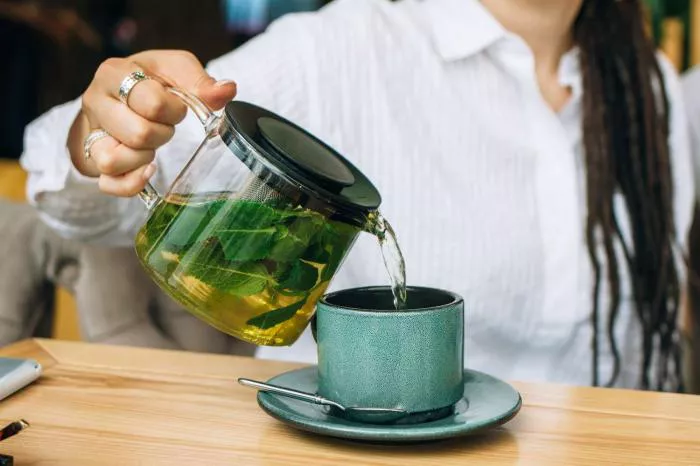Breastfeeding moms often have many questions about what they can and cannot consume. One common question is whether drinking green tea is safe while breastfeeding. Green tea is known for its health benefits, but when you’re nursing, you might wonder if it could affect your baby or milk supply. In this article, we will explore whether green tea is safe for breastfeeding mothers, the potential effects of caffeine, and some guidelines for moderate consumption.
The Benefits of Green Tea
Green tea is widely known for its health benefits. It is rich in antioxidants, particularly catechins, which may help reduce inflammation, support heart health, and boost brain function. Green tea is also a source of vitamins and minerals, such as vitamin B, magnesium, and potassium.
For breastfeeding mothers, these health benefits can be appealing, especially if you’re trying to maintain your energy levels or recover from the physical demands of pregnancy and childbirth. However, it’s important to consider any potential side effects when consumed during breastfeeding.
The Caffeine Factor
One of the main concerns about green tea for breastfeeding moms is its caffeine content. Although green tea contains less caffeine than coffee or black tea, it still has some, averaging around 25-35 milligrams per cup. Caffeine can pass into breast milk and may affect your baby, particularly if consumed in large amounts.
Newborns and infants have underdeveloped livers, which makes it harder for them to process caffeine efficiently. As a result, they may experience symptoms such as irritability, difficulty sleeping, or restlessness if exposed to too much caffeine through breast milk.
How Much Caffeine is Safe?
Experts generally recommend that breastfeeding mothers limit their caffeine intake to around 300 milligrams per day. This guideline allows room for moderate consumption of green tea, as long as you are mindful of other caffeine sources like coffee, chocolate, or soft drinks.
For example, if you have one or two cups of green tea per day, this should keep your caffeine intake within safe limits. However, if you are also consuming other caffeinated beverages or foods, it’s essential to be aware of the total amount of caffeine you’re consuming each day.
Potential Effects on Milk Supply
Another concern some breastfeeding moms have is whether green tea could affect their milk supply. There is no scientific evidence to suggest that green tea reduces milk production. In fact, drinking moderate amounts of fluid, including green tea, can help keep you hydrated, which is essential for maintaining a healthy milk supply.
However, if you’re drinking too much green tea or any other caffeinated beverage, the diuretic effect of caffeine may lead to dehydration, which could indirectly impact your milk production. The key is to maintain balance and ensure you’re drinking enough water along with any other beverages.
Tips for Moderate Green Tea Consumption
If you enjoy green tea and want to include it in your daily routine while breastfeeding, there are a few simple steps you can follow to ensure it’s safe for both you and your baby.
Limit to 1-2 cups per day: This keeps your caffeine intake within the recommended range and reduces the risk of any negative effects on your baby.
Watch for signs of sensitivity: Every baby is different, and some may be more sensitive to caffeine than others. If your baby shows signs of irritability, difficulty sleeping, or fussiness after you drink green tea, consider reducing your consumption or switching to a decaffeinated version.
Stay hydrated: Drinking plenty of water is essential for both you and your baby. Make sure to balance your green tea intake with enough water to prevent dehydration.
Consider decaffeinated green tea: If you’re worried about caffeine but still want to enjoy the benefits of green tea, consider switching to a decaffeinated version. It offers most of the same antioxidants and nutrients without the caffeine content.
Alternatives to Green Tea
If you’re unsure about drinking green tea while breastfeeding or prefer to avoid caffeine altogether, there are several herbal alternatives that may be more suitable. Some of these include:
Chamomile tea: Chamomile tea is caffeine-free and can help with relaxation and sleep, making it a great option for tired moms.
Rooibos tea: Rooibos is a caffeine-free herbal tea rich in antioxidants. It’s a good alternative for moms looking for a healthy beverage without the effects of caffeine.
Ginger tea: Ginger tea can be helpful for digestion and is naturally free of caffeine. It’s also a warming, soothing choice.
Peppermint tea: Peppermint tea is another caffeine-free option. However, some moms report that peppermint may reduce milk supply in large amounts, so it’s best to consume it in moderation.
Conclusion
In moderation, green tea can be a safe and healthy beverage for breastfeeding moms. Its rich antioxidant content and health benefits make it an appealing choice, but the caffeine content requires careful consideration. By limiting your intake to 1-2 cups per day and paying attention to your baby’s reactions, you can enjoy green tea without concern.
As always, if you have specific concerns or if your baby seems particularly sensitive to caffeine, it’s a good idea to consult your healthcare provider. They can provide personalized advice based on your health and your baby’s needs.
Staying hydrated, maintaining a balanced diet, and being mindful of caffeine intake are essential practices for breastfeeding moms. Whether you choose to drink green tea or opt for an alternative, making informed choices will help ensure both you and your baby stay healthy and happy.
Related topics:


